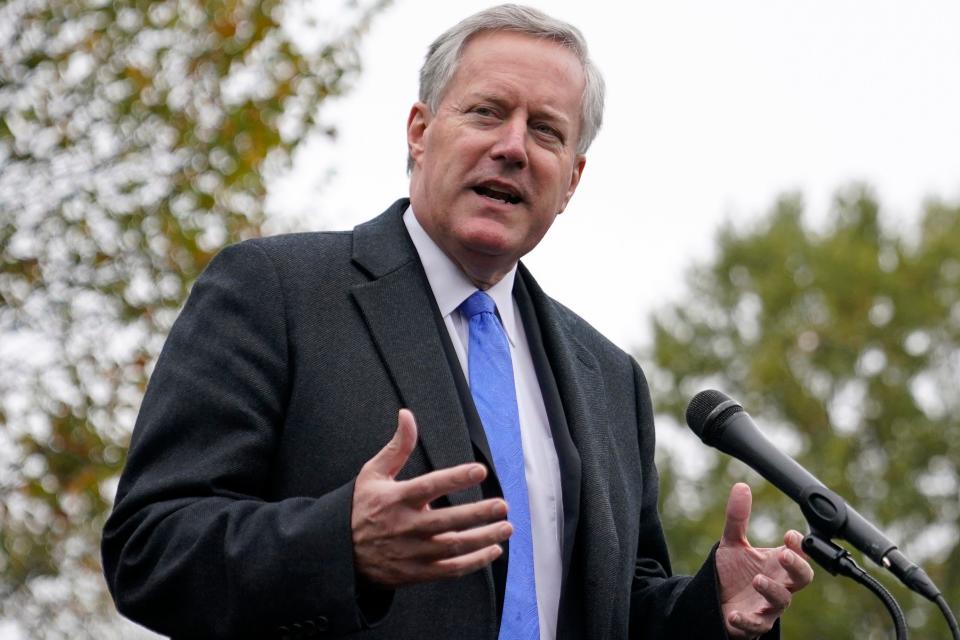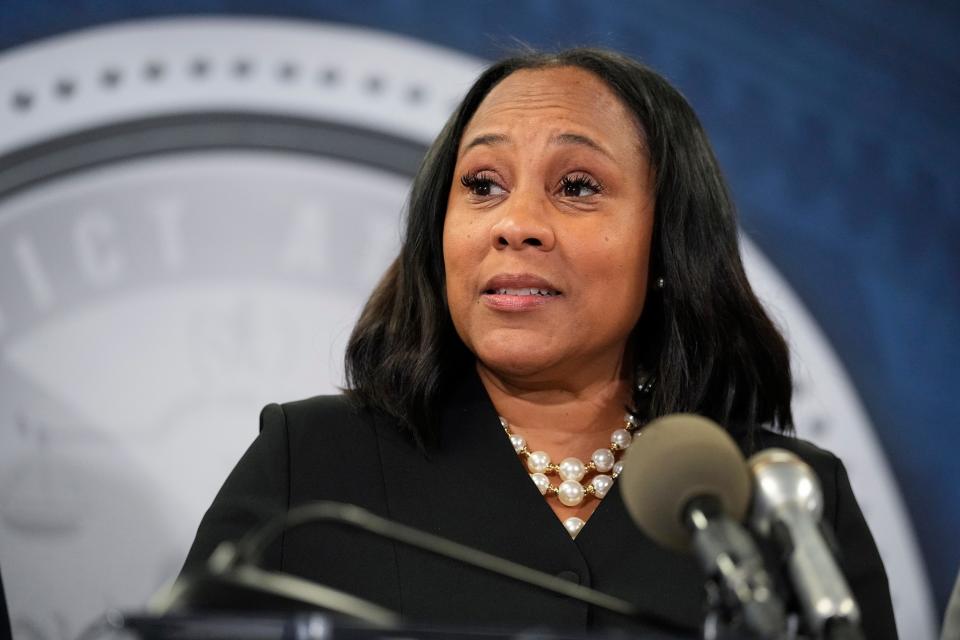Federal appeals court rejects former White House chief of staff Mark Meadows' request to move Georgia trial to federal court
- Oops!Something went wrong.Please try again later.
- Oops!Something went wrong.Please try again later.
- Oops!Something went wrong.Please try again later.
A federal appeals court on Monday rejected a request from Donald Trump's former White House chief of staff, Mark Meadows, to move his Georgia trial on election racketeering charges to federal court.
Meadows, who was charged with Trump and 17 others in what prosecutors say was a sprawling conspiracy to reverse President Joe Biden's 2020 victory in Georgia, argued the crimes he is accused of committing were part of his federal job. A federal judge rejected his request to move the case from state to federal court, and Meadows appealed.
But a three-judge panel of the 11th U.S. Circuit Court of Appeals in Atlanta ruled unanimously that a federal statute for moving cases to federal court doesn't apply to former officials.
Chief Judge William Pryor wrote in his decision for Judges Robin Rosenbaum and Nancy Abudu that even if the law applied to Meadows, "the events giving rise to this criminal action were not related to Meadows's official duties."

How did the appeals court reach its decision in Meadows' case?
The judges noted that a federal statute allows for a federal office to move a criminal case from state to federal court, to avoid harassment in performing official duties. The law Meadows invoked dates to the period after the Civil War, when southern states continued to resist federal oversight.
But the judges found the statute didn’t apply to former federal officials because charging them criminally wouldn’t affect a federal administration.
“In contrast, a state prosecution of a former officer does not interfere with ongoing federal functions – case-in-point, no one suggests that Georgia’s prosecution of Meadows has hindered the current administration,” Pryor wrote.
Meadows testified at his hearing in U.S. District Court that arranging calls and setting up meetings for the president were part of his job. But prosecutors and judges noted Meadows offered no limits to what the job entailed.
Rosenbaum had said during the oral argument Friday that Meadows appeared to claim everything he did fell under official duties. "That just cannot be right," Rosenbaum said.
The appeals judges ruled that the charges against Meadows allege an association with a conspiracy to overturn a presidential election, which wasn’t part of the job description.
“Simply put, whatever the precise contours of Meadows’s official authority, that authority did not extend to an alleged conspiracy to overturn valid election results,” Pryor wrote.
Clark Cunningham, a law professor at Georgia State University, expects Meadows to ask the Supreme Court to review the case because the panel broke new legal ground by ruling that former officials can never move a state case to federal court for prosecution.
Rosenbaum and Abudu, who agreed with the overall decision, wrote separately to express concern that opening federal officials to state prosecution as soon as they leave office would be a “nightmare scenario” when an administration ends.
“The million dollar question at this point is whether the Meadows case now goes on to the U.S. Supreme Court,” Cunningham said.

Meadows charged with racketeering over Trump call
Meadows, Trump and 17 others were charged in the alleged conspiracy being prosecuted by Fulton County District Attorney Fani Willis. Four defendants have pleaded guilty, but Meadows, Trump and the others have pleaded not guilty.
Meadows and a handful of other defendants contend their cases should be heard in federal court because they were federal officials at the time the alleged crimes occurred. Meadows testified in August that his actions scheduling and participating in meetings with Trump were part of his duties as chief of staff.
Meadows is charged with racketeering and with soliciting Georgia Secretary of State Brad Raffensperger to violate his oath of office during a call Jan. 2, 2021, when Trump asked him to "find" enough votes to overtake President Joe Biden's winning margin.
The indictment describes Meadows attending a White House meeting with Trump and Michigan lawmakers, sending messages to Pennsylvania lawmakers, requesting a memo regarding “disrupting and delaying the joint session of Congress on Jan. 6, 2021,” visiting a nonpublic audit of Georgia voting and arranging the Raffensperger call.
Besides Meadows, four other co-defendants have argued they should be protected from state-level charges because they served in federal posts for the acts charged in the indictment.
The best known is Jeffrey Clark, a former assistant attorney general, who is charged with drafting a letter for the attorney general to sign that allegedly raised false allegations of voter fraud in Georgia.
The three others were charged as Republican presidential electors who allegedly met and submitted false documents to support Trump's claim that he had won in Georgia: state Republican Chairman David Shafer, state Sen. Shawn Still and Cathy Latham.
Their requests to move their cases to federal court were also rejected.
This article originally appeared on USA TODAY: Mark Meadows can't get federal trial for Georgia charges: appeals court

